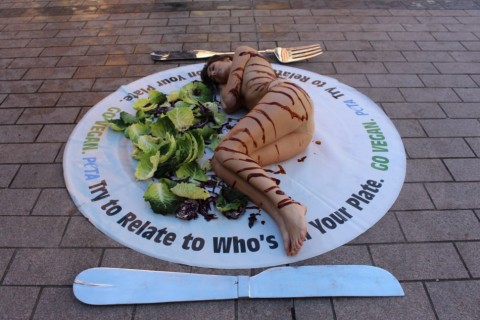These two “isms” are more intertwined than most people realize. For one, hundreds of misconceptions surround them. If you don’t take the time to wave off all the fancy banners, aggressive pamphleteers, and that one really rude vegan you met in a diner, it’s quite easy to have a clouded view of these ideologies. Two, there are speciality cafés for vegans and feminists because it’s so difficult to find other people who can turn the art of eating pancakes into a sociological argument (I’m sure it’s been done). Three— something I didn’t realize until recently— veganism has roots in feminism. As I’ve read, “to be a feminist is to be a vegan.” Welp guess I deserve the awkward turtle because I consider myself feminist… but I’m not vegan. The more I’ve learned about veganism’s connections to other social justice areas, though, the more I’ve started to decrease my intake of animal byproducts. Who knows, maybe one day I’ll decide to eat vegan, but for now let’s dig into why veganism is so closely tied to feminism.
What is feminism?
The core principle of feminism is equality for all people regardless of sex or gender identification or expression. Feminism does not mean that women are better than men, nor does being feminist mean you hate men. Anyone can be a feminist. Yes, guys, this means you too. Feminists are fighting for the rights of men as well to not be judged by their “maleness”. The perspective most people have of feminism is the radical, bra-burning feminists of the 1960s. Historically, feminism has evolved from the examination of inequality between the sexes to a more nuanced assessment of the social and performative constructions of gender and sexuality.
Here’s the rub:
A widely-held belief by feminists is that no person’s body should be exploited. To be feminist is to be a proponent for body autonomy. Only the individual can consent to what happens to her body and no one has the right to treat a woman’s body or treat a woman (or anyone else for that matter) as simply a vessel for reproduction. It seems silly to fight so strongly against female oppression and gender inequality while ignoring those same issues as applied to the meat, dairy, and egg industries to the extent that eating animal byproducts fuels female subjugation.
Dairy cows are treated as mere milk machines. Sows are treated as units of mass productions as they’re continuously impregnated. They spend their entire lives in tiny gestation crates, so small they can’t even turn around and they live in their own feces. Their offspring are carried away and slaughtered, especially the young males as they have no reproductive value. The lives egg-laying hens are very similar. Female animals lead miserable lives simply because they have a uterus, an organ that apparently subjects an animal to a life of reproductive exploitation and commodification. Also known as a reproductive slave.
Is this not the very ideology that feminists strive to break down? Beings are not simply the sum of their parts, and we certainly have no right to use another being’s organs for our benefit with complete disregard to their humanity. Sure, most animals cannot give consent to using their body, but they have a natural birth cycle for a reason. If animals were treated ethically and respected for their natural production of food and life, instead of as a mass production factory, then we would have more nutrient-rich food, happier animals, and I wouldn’t be so hesitant to enjoy animal byproducts.
Most of us know what it’s like to be seen as nothing but a body. Objectified for another person’s benefit. It’s dehumanizing and makes us feel like nothing. This is what we’re doing to female animals and to an extent their male offspring who are slaughtered simply because they can’t reproduce or lay eggs or give milk. This is exactly why intersectional approaches to social justice issues are necessary— one is not just a “feminist” in ideology without holding similar ideologies as a vegan. We’re all in this together, which I why I’m a little disappointed when a campaign for one social justice area inadvertently puts down another (e.g. the sexualization of women during World Vegan Day campaigns).
“Before you want to start talking about how the government needs to stay out of your body and your life, you better make sure that your own lifestyle doesn’t entirely revolve around objectifying other females and exploiting someone else’s body.” – Quoi Le Canard
At what point does this passionate battle for body autonomy extend to the suffering of female animals ? What gives anyone the right to dominate another being’s bodily function?


